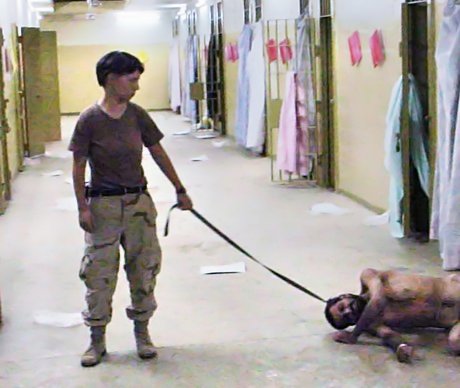compared2what? wrote:You are, again, misreading me, which I regret but am powerless to change.
well, let me see. You posted this:
compared2what? wrote:barracuda wrote:After further review, I have a number of questions about this shot, beginning with why, given that the media establishment was clearly on a mission to traumatize us with the most graphic images available, do we have only one shot of this particular scene - and an out-of-focus, poorly exposed one at that? And why is this the only view we have of the hollowed-out leg guy, who we can't even recognize from this angle and distance? Given the numerous graphic, very bloody images we have of Jeff, why didn't this guy get equal time? Were his prosthetics and make-up not as convincing as Jeff's? Where are the close-up shots of him lying in a pool of his own blood? And where is his iconic wheelchair shot?
Does anyone else see the problems with this line of questioning?
Yes. It's such a short step from what he's doing to

that I'm not sure there is one at all.
I mean, he's literally conditioning his readers to respond to slaughter in the streets by jeering at the victims and feeling good about themselves for doing it. And if that's not the same problem outlined
here in a slightly different configuration, I don't see how.
People think they're not capable of it. But that's why they are.
I realize how annoying that is, fwiw. Sorry. If I could think of something to do about it besides say it, I would.
______________
Edited for typos.
Which to me seems to be saying that the way McGowan wrote his article is one step behind what certain soldiers did to prisoners in Abu-Ghraib prisoners in terms of its dehumanization.
Am I incorrect in my interpretation? Please correct me if I am.
The article that you linked to in the second part of your post is about new thinking with regards to the banality of evil. A short exerpt:
People do great wrong, not because they are unaware of what they are doing but because they consider it to be right. This is possible because they actively identify with groups whose ideology justifies and condones the oppression and destruction of others.
I see that you could apply this to McGowan in a loose way if you believe that he is oppressing or destroying others with his research, and you seem to be arguing that that is the case with your conviction that he is in essence 'revictimizing the victims.' I can understand why you would say that, and I agree that this type of research treads a thin line - the doubt that is raised as to the authenticity of the victims can be labeled as dehumanizing. However I argue that we can't shy away from these questions just because they are awkward. It would be too easy, then, for tyrants to shut down debate claiming that it might hurt someone who is innocent.
The quote from the article, above, can be applied another way, though. It can be applied to the people trying to shame others into not looking into hard to look in to areas - ie the use of actors and props and other propagandistic tools at the scenes of world events.
To be blunt, your association (however slyly attempted) of McGowan and his 'methods' with the vague, shadowy world of Kabbalah followers and then the monstrous soldiers who took joy in torturing prisoners at Abu-Ghraib can be seem in the light of someone doing 'great wrong because she considers is to be right. It is possible for you to do this because you actively identify with groups whose ideology justifies and condones the oppression and (character) destruction of others."
Satire is a sort of glass, wherein beholders do generally discover everybody's face but their own.-- Jonathan Swift
When a true genius appears, you can know him by this sign: that all the dunces are in a confederacy against him. -- Jonathan Swift






